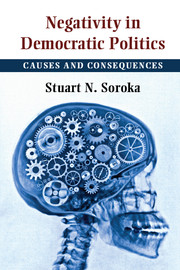Book contents
5 - Media Content
Published online by Cambridge University Press: 05 June 2014
Summary
The real news is bad news.
– Marshall McLuhanMass media content is written by people and for people, and should thus exhibit the same kinds of biases as have been seen in Chapters 3 and 4. Just as people show asymmetric responsiveness to negative versus positive information, so too should mass media.
Making the case for asymmetries in media content is, admittedly, relatively easy. Indeed, it is not clear that a case needs to be made at all. Mass media have a widespread and well-earned reputation for focusing on the negative. A literature review that follows makes clear just how widespread this view is. There is near-universal agreement that media content leans toward the negative.
There is however relatively littlework that provides a good sense, empirically speaking, of just how biased toward the negative media are. What exactly is the difference between the distribution of positive versus negative information in media and the distribution of positive versus negative information in the real world? That is the central question addressed in this chapter. That media exhibit a negativity bias is relatively clear; exploring and documenting the extent of that bias is the aim here.
- Type
- Chapter
- Information
- Negativity in Democratic PoliticsCauses and Consequences, pp. 72 - 94Publisher: Cambridge University PressPrint publication year: 2014

